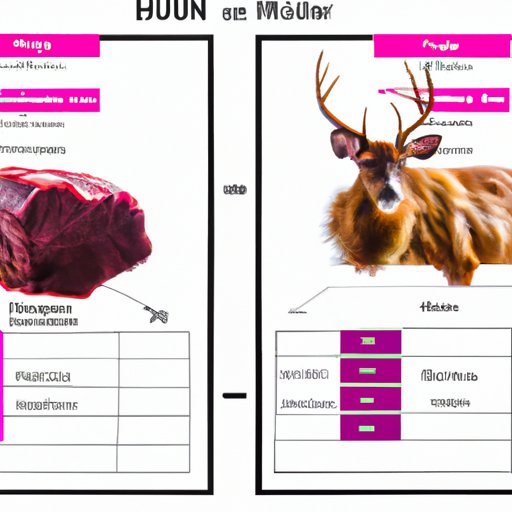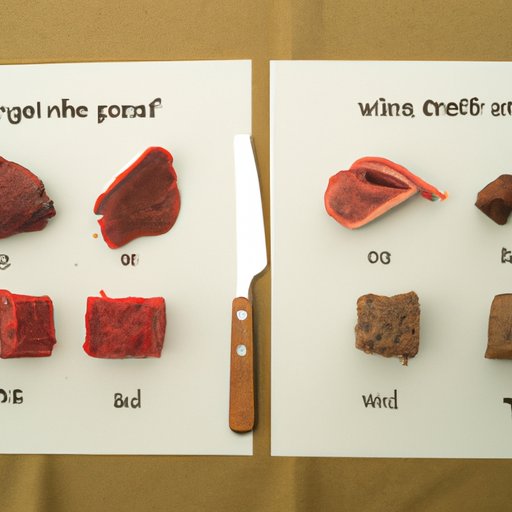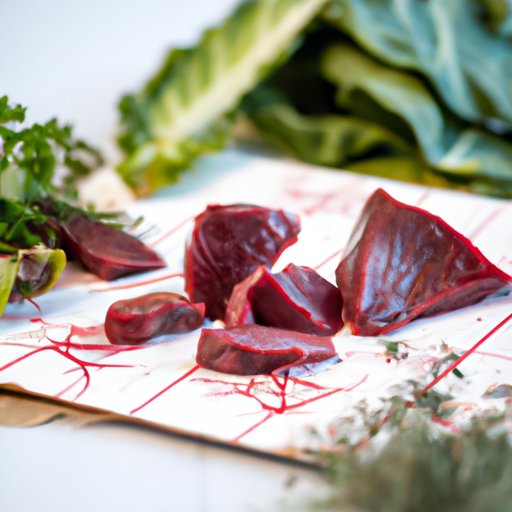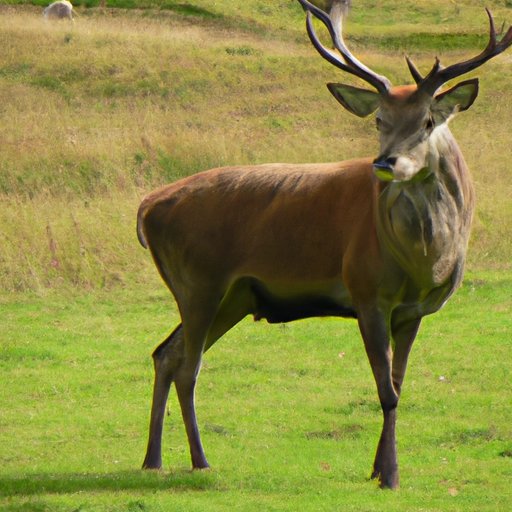Introduction
When it comes to choosing a protein source, there’s always a debate between venison and beef. On one hand, you have deer meat, which is often touted as being healthier than beef due to its low fat content and high concentration of vitamins and minerals. On the other hand, you have beef, which is widely available and has been part of many traditional diets for centuries. So which is better for you—venison or beef?
In this article, we’ll explore the debate surrounding venison vs. beef in detail. We’ll compare the nutritional makeup of both meats, look at the health benefits that each offers, examine their environmental impacts, and investigate the ethical implications of eating either one. By the end of this article, you’ll be able to make an informed decision about which meat is best for you.

Comparing the Nutritional Makeup of Venison and Beef
Before we dive into the specifics of venison vs. beef, let’s take a look at the general nutritional makeup of both meats. Both venison and beef are excellent sources of protein, with approximately 20-25 grams per 3-ounce serving. They also provide plenty of B vitamins, such as thiamin, riboflavin, niacin, and vitamin B12.
When it comes to calories, venison is slightly lower than beef. A 3-ounce serving of venison contains approximately 150 calories, while a 3-ounce serving of lean beef contains approximately 170 calories. As far as fat content goes, venison is significantly lower than beef. Venison contains only 4-5 grams of fat per 3-ounce serving, compared to the 11-13 grams found in beef.
Exploring the Health Benefits of Eating Venison
Venison is not only lower in fat than beef, but it also offers several unique health benefits. For starters, it’s an excellent source of omega-3 fatty acids, which can help reduce inflammation, improve heart health, and boost brain function. It’s also an excellent source of vitamin B12, which is important for maintaining healthy red blood cells and nerve cells. Finally, venison is much higher in iron than beef, which can help promote healthy energy levels.
Another benefit of eating venison is that it’s much less likely to cause foodborne illnesses than beef. This is because deer are wild animals, so they don’t come into contact with the same kinds of bacteria and parasites that can contaminate beef from commercial farms.
Examining the Environmental Impact of Raising Cattle vs. Hunting Deer
When it comes to environmental impact, raising cattle and hunting deer present two very different pictures. Cattle production requires a lot of resources, including land, water, and feed. It also generates large amounts of carbon dioxide, which contributes to climate change. On the other hand, deer hunting has a much smaller environmental footprint, since deer are wild animals that don’t require any additional resources.
Cattle production also uses a lot of water. It takes approximately 1,800 gallons of water to produce one pound of beef, whereas hunting deer does not require any additional water. Additionally, cattle production requires large amounts of land for grazing and feed production, whereas hunting deer only requires land for hunting.

Tasting Venison vs. Beef: A Comparison for Foodies
When it comes to flavor and texture, venison and beef offer two distinct experiences. Venison has a richer, gamey flavor that some people find more appealing than the milder taste of beef. In terms of texture, venison is typically leaner and more tender than beef, making it ideal for dishes like stews and roasts.
When it comes to cooking methods, venison and beef can both be cooked using a variety of techniques, such as grilling, roasting, and braising. However, due to its lower fat content, venison should be cooked at lower temperatures and for shorter periods of time than beef to ensure that it doesn’t become tough and dry.

Investigating Venison as a Sustainable Meat Source
When it comes to sourcing venison, hunters in certain areas may be able to hunt their own deer, which is an incredibly sustainable way to obtain meat. If you don’t have access to hunting, you may still be able to purchase venison from local farmers or specialty stores. The cost of venison varies depending on where you live, but it’s usually comparable to the cost of grass-fed beef.
When it comes to availability, venison is less widely available than beef. This is due to the fact that deer are wild animals, so they aren’t raised in large numbers like cattle. However, if you’re willing to do some research, you should be able to find a reliable source of venison in your area.
Exploring the Ethical Implications of Eating Venison vs. Beef
Finally, it’s important to consider the ethical implications of eating venison vs. beef. When it comes to animal welfare, hunting deer is generally considered to be more humane than raising cattle for meat. This is because deer are wild animals that live in their natural habitat, whereas cows are confined in feedlots and subjected to factory farming practices.
The human labor implications of consuming either meat are also worth considering. While hunting deer requires a considerable amount of skill and knowledge, raising cattle requires large numbers of workers to manage the animals and process the meat. Additionally, some cultures view deer hunting as a sacred activity, while others view it as a recreational sport.
Conclusion
The debate between venison and beef is complex, and ultimately the decision of which meat is best for you depends on your individual needs and preferences. When it comes to nutrition, venison is lower in fat and higher in certain vitamins and minerals than beef. It also offers unique health benefits, such as a lower risk of foodborne illnesses and a higher concentration of omega-3 fatty acids. Additionally, hunting deer has a much smaller environmental impact than raising cattle.
When it comes to taste and texture, venison and beef offer two distinct experiences. Venison has a richer, gamey flavor and is typically leaner and more tender than beef. It’s also relatively easy to source and is usually comparable in cost to grass-fed beef. Finally, when it comes to ethical considerations, hunting deer is generally viewed as more humane than raising cattle.
Given all these factors, it’s up to you to decide which meat is best for you. Whether you choose venison or beef, make sure to do your research and source your meat responsibly. With a little bit of effort, you can make an informed decision that’s best for your health, the environment, and the animals involved.
(Note: Is this article not meeting your expectations? Do you have knowledge or insights to share? Unlock new opportunities and expand your reach by joining our authors team. Click Registration to join us and share your expertise with our readers.)
